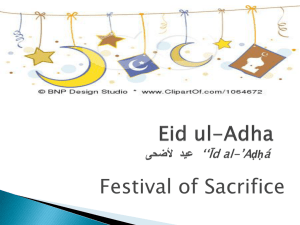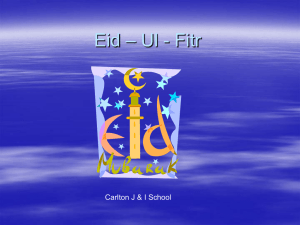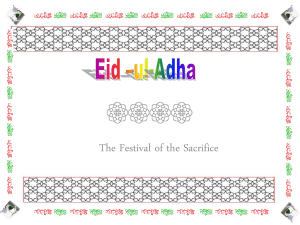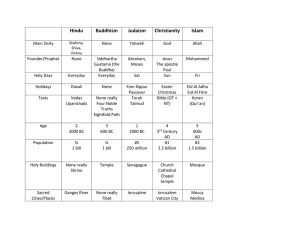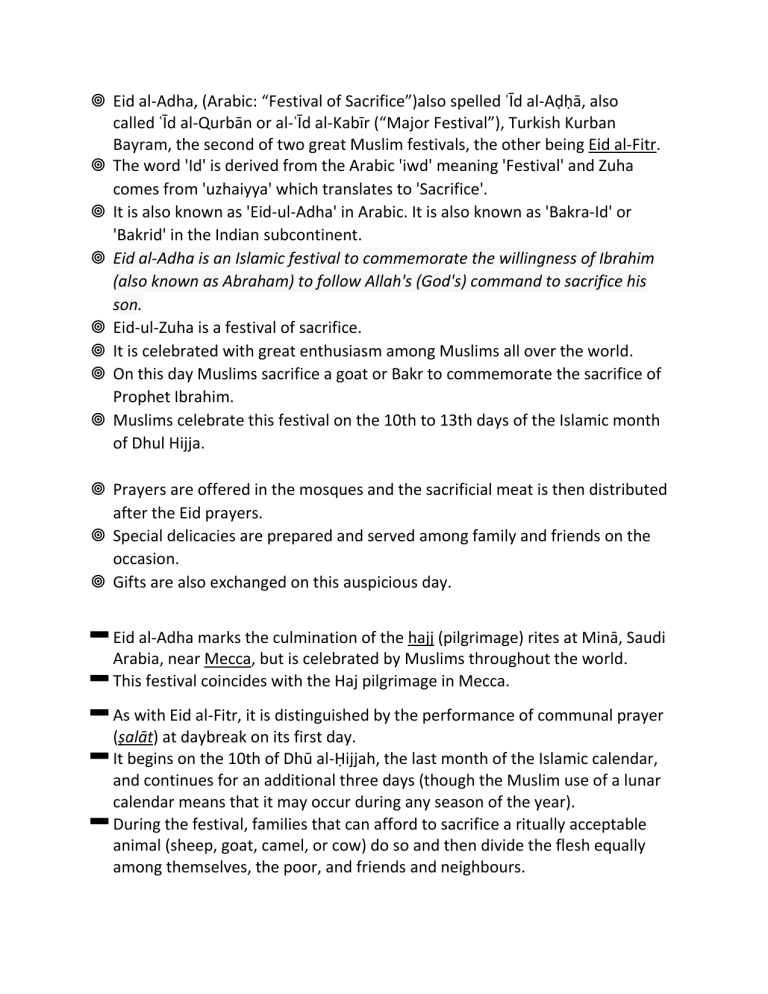
Eid al-Adha, (Arabic: “Festival of Sacrifice”)also spelled ʿĪd al-Aḍḥā, also called ʿĪd al-Qurbān or al-ʿĪd al-Kabīr (“Major Festival”), Turkish Kurban Bayram, the second of two great Muslim festivals, the other being Eid al-Fitr. The word 'Id' is derived from the Arabic 'iwd' meaning 'Festival' and Zuha comes from 'uzhaiyya' which translates to 'Sacrifice'. It is also known as 'Eid-ul-Adha' in Arabic. It is also known as 'Bakra-Id' or 'Bakrid' in the Indian subcontinent. Eid al-Adha is an Islamic festival to commemorate the willingness of Ibrahim (also known as Abraham) to follow Allah's (God's) command to sacrifice his son. Eid-ul-Zuha is a festival of sacrifice. It is celebrated with great enthusiasm among Muslims all over the world. On this day Muslims sacrifice a goat or Bakr to commemorate the sacrifice of Prophet Ibrahim. Muslims celebrate this festival on the 10th to 13th days of the Islamic month of Dhul Hijja. Prayers are offered in the mosques and the sacrificial meat is then distributed after the Eid prayers. Special delicacies are prepared and served among family and friends on the occasion. Gifts are also exchanged on this auspicious day. Eid al-Adha marks the culmination of the hajj (pilgrimage) rites at Minā, Saudi Arabia, near Mecca, but is celebrated by Muslims throughout the world. This festival coincides with the Haj pilgrimage in Mecca. As with Eid al-Fitr, it is distinguished by the performance of communal prayer (ṣalāt) at daybreak on its first day. It begins on the 10th of Dhū al-Ḥijjah, the last month of the Islamic calendar, and continues for an additional three days (though the Muslim use of a lunar calendar means that it may occur during any season of the year). During the festival, families that can afford to sacrifice a ritually acceptable animal (sheep, goat, camel, or cow) do so and then divide the flesh equally among themselves, the poor, and friends and neighbours. Eid al-Adha is also a time for visiting with friends and family and for exchanging gifts. This festival commemorates the ransom with a ram of the biblical patriarch Ibrāhīm’s (Abraham’s) son Ismāʿīl (Ishmael) . Muslims around the world observe this event. Eid al-Adha is the latter of two Eid festivals celebrated by Muslims, the first being Eid ul-Fitr. Eid al-Adha or Eid Qurban (Persian: ) ق رب ان ع يد, also called the "Festival of the Sacrifice", is the second of two Islamic holidays celebrated worldwide each year Eid Ul Adha is a Muslim festival that basically marks the end of Hajj or Pilgrimage to Makkah. Eid ul Adha takes place in the month of hajj on the 10th of Zil hajj after all the pilgrims to Makkah have performed the obligatory events. This Eid is also known as the Eid of sacrifice, and it basically commemorates the faith of Abraham and devotion to Allah. According to the Belief of the Muslims, Allah asked Abraham to sacrifice his son for Allah’s sake, and even though he was a good man and loved his son very much, his devotion and faith to God was so strong that he did not hesitate to take this bold step and agreed to sacrifice his son. The willingness of Abraham to sacrifice his son for the sake of Allah caused Allah to spare his son’s life, and therefore a lamb was sacrificed in his place. This was a miracle of Allah and it proved that he has command over all things and the known and the unknown. It is because of this holy incident in the History of Islam that the Muslims now celebrate Eid ul Adha every year to earn Allah’s blessings and forgiveness. Eid ul Adha is a sacred Muslim event that is celebrated every year around the world with sacrifice, prayer and food. ./ Eid Ul Adha is also known as the greater Eid and it is the second most important festival in Islam. In the United States and Canada many Muslims gather and offer the morning prayers at a mosque or in an open environment instead of eating breakfast. After the morning prayers people gather with their family and friends and they enjoy being together. In Egypt EId-ul-Adha is celebrated by offering morning prayers and enjoying the feast. The morning prayers and the sermon are an important element and Muslim tradition around during this Eid holiday. The people meet with each other like that in USA in order to celebrate socialize and enjoy this historic day in Egypt. The people also offer sacrifices in the form of Goat, Lamb, Camel and Cow. The meet from the sacrifice is then distributed among the poor people in the form of charity. Eid Ul Adha is celebrated as a four day event in Pakistan. All the stores are closed on the day of Eid and like that in other countries Muslims gather for the prayers and listen to the sermon in the mosque. And it is celebrated in the same fashion in the countries like Morocco and Bangladesh. All these countries are Muslim dominated societies. For the Non-Muslim countries there are no national holidays and the Eid Al adha is celebrated with some limitations. However it is a fundamental festival of Islam and a time of happiness for all the Muslims around the world. The Prophet (PBUH) said, “For every people there is a feast and this is our feast.” [Sahih Bukhari] Why do Muslims sacrifice an animal on this day? During the celebrations of Eid Ul Adha the Muslims as discussed earlier remember the trials and hardships faced by the prophet Abraham. The slaughtering of animals in the remembrance of this holy event has been a very misunderstood concept around the world outside the faith of Islam (Rabbani, 2010). Allah has given us power and has permitted us to eat meat, but only in if we slaughter them in the name of Allah. Muslims slaughter the animals in the same way throughout the year. By calling the name of Allah in the time of slaughter reminds us that the life that we are taking is sacred. The meat from the sacrifice is mostly given away to others. Normally one-third of the meat from sacrifice is eaten by the immediate family members and relatives, one third is usually kept for friends and the rest is donated to the poor. Some people have been known to donate a lot of money to the poor in the name of Allah to earn Allah’s blessings. The act also portrays a clear example in which we just give up things that are dear to us in the way of Allah just to follow his command. This act also promotes brotherhood in the Muslim society. This act also refreshes our faith in Allah and we recognize that all the blessings come from Allah Alone. It is very important to understand that sacrifice offered by the Muslims on the day of Eid has nothing to do with washing ourselves from sins. This is basically a misunderstanding created by those of previous generations.
